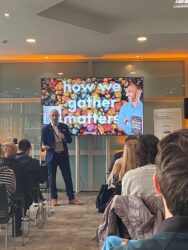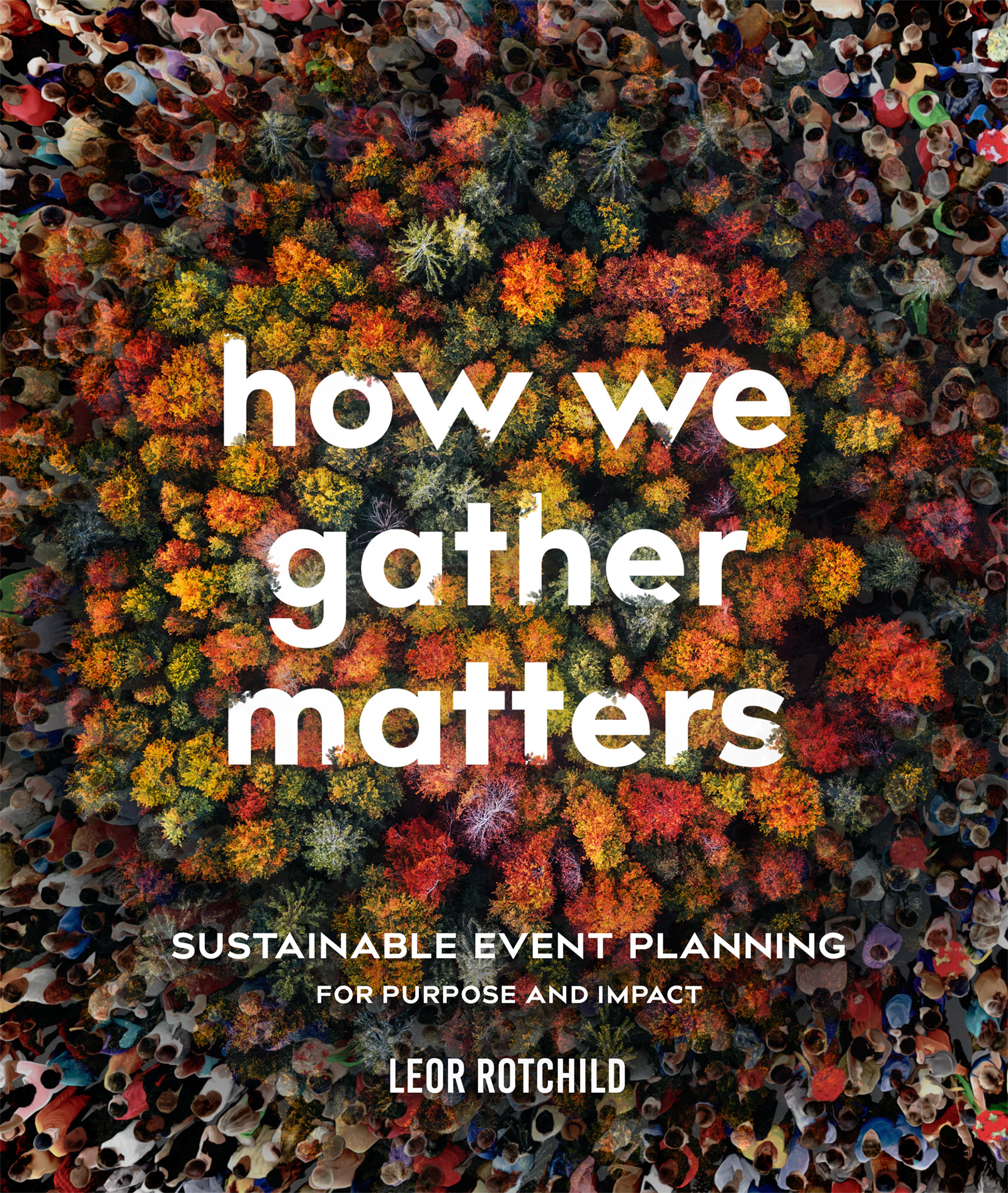How We Gather Matters is not your usual how-to guidebook to sustainable events. It is a can’t-put-it-down page-turner that will make you rethink not just how you plan events, but how your events can change the world.
You know those books that keep coming back to you long after you finish the last page? The books that make you rethink the higher purpose your work is meant to serve, but sometimes gets lost in the everyday logistical noise? The books that resonates even beyond work to how you look at the way you live your life? How We Gather Matters, a 224-page master class in creating purposeful, sustainable, meaningful events, is one of those books. And it’s a can’t-put-it-down page-turner to boot.
 I was fortunate to be able to meet the author, Leor Rotchild, during a press trip dinner in Calgary, his hometown, and was struck by his passion for more purposeful, sustainable events. I dove into the book on the long flight home to Boston, then re-read it a couple of weeks later to scoop up any nuggets of insight I may have missed on the first go-round.
I was fortunate to be able to meet the author, Leor Rotchild, during a press trip dinner in Calgary, his hometown, and was struck by his passion for more purposeful, sustainable events. I dove into the book on the long flight home to Boston, then re-read it a couple of weeks later to scoop up any nuggets of insight I may have missed on the first go-round.
What I found most addictive about this book was that it centers around the idea that meetings and events can, and should, drive positive change in the world.
We’ve all heard the saying, “When we meet, we change the world,” and that is true. This industry contributes much to improving the world economically, scientifically, medically and professionally, on personal, professional, community and sometimes national and international levels. But all too often, that change is muted, drowned out by the impulse to create wow-for-now moments, rather than commitment to making the event worth the financial, time and environmental investment through more global impact.
Yes, How We Gather Matters provides a practical blueprint for everything from how to leverage procurement to build a circular economy — along with easy-to-understand breakdowns of what that sentence actually means — to how to break free from bottled water without sparking a rebellion, and how to work with venues to make meetings more sustainable.
But the brilliance of the book is that the author doesn’t lecture. Yes, you will learn probably more than you want to know about the circular economy, net zero events, and the nitty gritty of sustainability in event venues.
But he also tells stories of both successes and failures, of the human motivations behind some of the behaviors that stymie progress toward goals, and of some of the lessons he’s personally learned through his decades of managing events whose purpose is to transform the world into one that is more environmentally and humanly sustainable.
You will learn how to design events that engage attendees and all stakeholders while also getting the back-office work done to make the event sustainable environmentally and in human terms. You will learn how to gently nudge diverse teams and stakeholders to make decisions that will result not only in short-term financial gain but also will move the world toward achieving a higher level of sustainability.
While parts of the book, written during the pandemic downtime, sound a bit nostalgic when set against today’s increasingly transactional sociopolitical climate, it’s also a refreshing reminder that some things, like the health of the planet and the well-being of the people who inhabit it, can change things for the better whatever political or societal winds are blowing at the moment.
The book starts with a chapter on purpose, and that’s on purpose, he told me. “It’s the idea of purpose beyond just financial gain. Obviously, making money is a good thing, because it helps you sustain the activity and ideally grow and scale its positive impact. But knowing what that impact is should be your North Star, the reason your event exists, and what you measure the success of your event against.” Which is also why many of the step-by-step guides in the book start with Step 1 being to revisit your larger purpose in holding the event, the change you ultimately hope it will contribute from the keynote dais to the world stage.
I have read many good books about how to make meetings more sustainable, purposeful, engaging and impactful, but I would put How We Gather Matters at the top of my list, along with Priya Parker’s The Art of Gathering and Adrian Segar’s Conferences That Work series. Whether you want an in-depth exploration of sustainability in events, a detailed list of ways to reduce risk and increase profitability, an extensive checklist of tools and resources, a reminder of how important your work really is when it comes to meaningfully contributing to a more inclusive and sustainable world, or just a whole lot of engaging storytelling, this book has what you’re looking for.
As Rotchild explains, “Events are so much more than just gatherings — they’re mirrors of what we value and rehearsals for the future we want. Whether it’s a world summit or a small business luncheon, the choices event organizers can demonstrate leadership and ripple outward. My hope is that readers of my book feel equipped and inspired to rethink how they gather, and to use events as platforms for community, climate action and meaningful change.”
You can learn more about the book, and the author’s independent consultant services, which include supporting clients to integrate purpose and sustainability into strategies, supply chains, communications and events, at leor.ca.
You May Also Be Interested In…
Sustainability Takes Center Stage at IMEX Frankfurt 2025












